- Home
- Fredric Brown
The Dead Ringer Page 2
The Dead Ringer Read online
Page 2
She said, “Let’s not, Eddie.”
“All right,” I said. “I’ll be good.”
“Because—I like you, Eddie.”
I laughed. “That’s a good reason.”
“And I want to keep on liking you. Maybe that sounds silly, but— And quit looking at me, please, Eddie. I know I’ve got mud all over me and I look like hell.”
“I wouldn’t say that,” I told her. “Not quite.”
“Well, stop looking anyway.”
“Okay,” I said. I leaned forward and switched off the little light on the instrument panel. “Now I can’t look. Satisfied?”
“As long as you don’t try the Braille sys— I’m sorry, Eddie.”
“Sorry for what?”
“For talking cheap, like that. I guess I’ve been on the defensive ever since I joined the carney last week. All the men with the carney are such—such lice.”
“Not all of them. There’s my uncle, and Hoagy, and—”
“I didn’t mean Hoagy. He’s a sort of an uncle of mine. Not a real uncle, but he knew my parents once, and Marge was a friend of my mother’s. He got me this job with the carney. And, anyway, he and Marge are so nuts about each other nobody’d have to worry about Hoagy making passes.”
“Yeah,” I said. “I like Marge, too.”
“And your uncle—I didn’t meet him till tonight. Who and what is he?”
“Ambrose Hunter,” I said. “But just call him Am, or he’ll turn you over his knee. He’s the best guy in the world, just about.”
“I—I’d like to know him.”
“You will,” I said. “And there are other good guys. Like Lee Carey, the magician with the side show. Like swing music?”
“Sure.”
“Carey’s got a phono and some swell records. We’ll go listen to ‘em sometime. And you’ll like him, too. And I’ll guarantee he won’t make passes.”
“Why not?”
“Because, well—”
“You mean if he made them at anyone, it would be at you?”
I said, “He wouldn’t do that, either. He wouldn’t do that because— Oh hell, let’s skip it. Your guess was close enough. But he’s a nice guy, anyway, and you’ll like him.”
“Okay, then we’ll listen to his phonograph sometime. But the other carneys I’ve met—”
“I think you’ve got the wrong slant on them, Rita. The morality of a carnival isn’t that of a Presbyterian church in the Bible Belt. But if you were in a jam, they’d give you the shirts off their backs—most of them—and not because they expected anything back for it.”
“Ummm—maybe you’re right.”
“Sure I’m right. You got off on the wrong foot, judging them. You’ve got to see things the way they see them, to get along. They’re—well, they’re dishonest in an honest kind of way.”
“You mean, never give a sucker an even break?”
“That isn’t exactly it, but—more or less.”
“I believe in that, Eddie. Someday I’m going to find myself a sucker. A rich one. I’m not going to be poor all my life. I grew up that way, and that was plenty.”
She meant it; there was something a little fierce in her voice.
She said, “You think I’m a gold-digger, don’t you? Well, I am.”
“That’s fine,” I said. “So you’re a gold-digger. So don’t get so excited about it. Put your head on my shoulder and relax.”
She laughed a little, and then put her head on my shoulder. She said, “You’re funny, Eddie. I like you. I wish you were rich, so I could make a play for you. But you aren’t, are you?”
“I’ve got nineteen dollars and a trombone,” I told her. “I think I’m rich. Oh, and I’ve got one good suit, but I haven’t got it on and I wish I had because it’s getting cool. All I’ve got on under this raincoat is a pair of shorts. I was asleep when the excitement started.”
“Me, too. I mean, I’d gone to sleep and I woke up and had to go to the—what is it you call it, with a carney?”
“The doniker,” I told her. “Look, don’t talk about what happened. I’m supposed to get your mind off it.”
“I’m all right now, Eddie; don’t worry. I just—got a little hysterical back there for a minute. I don’t mind talking about it.”
“Okay. Then, in that case, maybe it’ll even do you good to talk about it. Look—do you always carry a gun when you go to the doniker?”
“Of course not; don’t be silly. It was because the lights were all out, and I couldn’t find a flashlight. And I’m afraid of the dark, Eddie. I mean, when I’m alone in the dark; I’m not afraid now.
“I don’t sleep on the lot, usually. I’ve got a room downtown in a hotel. But tonight Darlene asked me to stay with her.”
“Darlene? That’s the redhead, isn’t it?”
“Yes. Her man’s out of town for a couple of days, and she wasn’t feeling well tonight and asked me to stay with her. In their trailer. When I woke up an hour ago or thereabouts, I couldn’t find a flashlight and didn’t want to wake Darlene. But I happened to know where Walter kept his gun because I’d seen it before when Darlene opened a drawer. So I took that.”
She shivered a little; I thought maybe because her mind had gone back to what had happened after she left Walter’s trailer. I tightened my arm around her. I said, “Don’t think about it, Rita.”
“I’m all right, Eddie. I told you that. Except I’m cold. I haven’t got much more on under this coat than you have under yours, and I’m freezing.”
I said, “And a fine exhibit we’d make if a state police car came by and picked us up for parking. Besides, the police will be at the lot by now, and they may get huffy if you’re gone too long. So shall we go back?”
“Yes.”
“You’re sure you’re all right, and set to face the music?”
“Yes, Eddie. Kiss me, just once and nicely. And then let’s go back.”
I kissed her—just once and nicely. And it was plenty nice. It jolted me a little; I hadn’t been expecting anything like it.
I whispered, “Are you sure we should go back?”
“Yes, Eddie. Please.”
“Okay,” I said, “But someday, maybe?”
“Someday, maybe.”
So I turned the ignition key and stepped on the starter and the windshield wiper started wiping again, back and forth across the glass irregularly, like a drunken metronome. I felt a bit drunk myself.
And again I had to concentrate on keeping the car on that shiny strip of black road, so we didn’t talk on the way back.
CHAPTER II
At the carney lot, there were more lights on. The generator hadn’t been fixed yet, but oil and carbon lamps had been dug up and hung at strategic spots. It looked weird, somehow; I mean the spots of light made the places in between seem darker and scarier.
There was a light on inside Hoagy’s trailer. Uncle Am came out of the door of it as I eased the car back into position. He opened the door of the car and said, “Hi, kids. How was the moon?”
“Brightly shining,” I told him. “I-I feel fine,” Rita said. “Is everything okay, Am?”
“Everything’s ducky. The police have arrived and, if I may coin a phrase, have the situation well in hand. They’ve set up headquarters in the freak show top. They want you to show up there, but just for a few routine questions.”
“Shall I go with her, Uncle Am?” I asked. “You stay out of it, Ed. I told ‘em we’d sent Rita for a drive around the block and I didn’t mention who with. So you can just disappear quietly into your bunk.”
It sounded like a good idea because I was cold through, now. My raincoat felt as wet on the inside as it was on the outside, and clammy.
Rita said, “Thanks a lot, Ed. See you tomorrow.” She gave me her hand a minute and I said, “Sure. Tomorrow,” and then watched her walk toward the freak show top.
I stood there shivering a minute, and then went to our sleeping top. I toweled myself off again, put a couple of b
lankets on my cot and climbed in under them.
I was sleepy, but not yet asleep, when Uncle Am came in and started undressing. I said “Hi” to let him know I was awake.
“Like Rita?” he asked.
“She’s all right.”
“That doesn’t sound enthusiastic. Or does it? Anyway, don’t fall too hard. She’s the type that’s out after dough.”
“Uh-huh,” I said. “She told me so. Said if I was rich she’d make a play for me.”
Uncle Am shook his head slowly. He said, “That’s dangerous, kid. When they’re honest with you, that’s dangerous.” I couldn’t tell from his voice if he was serious or not.
I said, “Then if they’re dishonest, they’re not dangerous?”
“Not the same way.” He stood up and put out the carbide lamp. Then the cot creaked as he got into it.
I asked, “Who was the kid?”
“What kid?”
“The one that was killed, of course. Was he with the carney?”
“Hell,” said Uncle Am, “I forgot you haven’t been around. It wasn’t a kid, Ed. It was a midget.”
I sat up. A midget—that could mean only one thing. There was only one midget with the carnival.
“You mean it was the Major?” I demanded.
“No. Nobody knows him. This midget wasn’t with the carney, Ed. Nobody around here had ever seen him before.”
For a minute I thought he was kidding me. It didn’t make sense. A midget who wasn’t with the carney found stabbed to death and stark naked in the freak show top. A midget nobody with the carney even knew was around.
It sounded fantastic. But then I realized Uncle Am wouldn’t be kidding me about a thing like that.
“Where were his clothes?” I asked. “Did they find his clothes?”
“No.”
“But how the hell—?”
Uncle Am said, “It’s none of our business, Ed. Let the cops worry about it.”
“All right,” I said. I lay down again. And after a while I went to sleep.
I got up early the next morning. I don’t know why, except that I woke up and got thinking, and couldn’t go back to sleep. Uncle Am always says thinking is dangerous; that’s one of his pet themes—that thinking is worse than getting drunk but not quite as bad as smoking reefers. Somewhere in between. Of course, he doesn’t really mean it.
I got dressed, putting on my best suit; I don’t know why. Uncle Am didn’t wake up.
Outside, the sky was a dull gray, but the rain was over. It was hot, even that early. There wasn’t a breath of air and the canvas of the tops hung as still as though it was chiseled out of gray stone, the same color as the sky.
I stood there on the soggy grass in front of our tent, wondering what in hell I’d got up for. Probably, I decided, to keep from thinking.
I turned up the cuffs of my pants to keep them out of the mud and went on out to the midway. Over past the merry-go-round there were some men shoveling shavings off a truck into the mud. Otherwise there was nobody in sight.
I walked down to the end, where Hoagy’s trailer was. Marge, I knew, generally got up early. I was honest enough with myself to admit that I wanted to see her solely to lead the conversation around to Rita.
But there wasn’t any light in Hoagy’s joint, or any sign of life. Nor was there at Walter-and-Darlene’s trailer, around the curve of the oval. Not that I’d expect Rita to be up yet; she must have got to bed a long time after I did.
I started back to the midway, and I felt like sloshing through the puddles, but I didn’t. I went around the high-dive tank with its platform high up on a tall pole. I looked up and shivered a little at the thought of being up there and diving from that awful height into four and a half feet of water. Not that I ever intended to dive from up there, but I had dreams about it once in a while.
When I was back on the midway again I saw a man in front of the freak show who was a stranger to me. He was sitting on the edge of the bally platform, smoking a cigarette. He was a big guy, with a kind of dumb look on his face. He looked like he might be a cop. When I got close enough that I could see his shoes, I decided he was a cop.
But I thought even a dumb cop might be better than nobody at all to talk to, that is, if he wanted to talk.
I said, “Hi” and he said “Hi” back in the right tone of voice—not too interested or enthusiastic, just ordinarily friendly—so I stopped.
“Cop?” I asked him.
“As you can plainly see,” he said. “I try to dress and look the part, to please the suckers.”
That was better than I’d expected. I sat down on the bally platform too. “How goes it?” I asked him.
“Lousy,” he said. “The way these goddamn carneys cooperate— You a carney?”
“Yeah,” I said. “I hear the guy was a midget. Who was he?”
“We don’t know,” he said. “Tie that. Nobody knows him. Nobody ever heard of him. Nobody ever saw him. Nobody ever smelled him. Hell. We get a freak, dead in his birthday suit in a freak show, only nobody ever heard of him. They say.”
He threw his cigarette down in the wet grass, pulled out a crumpled package and put a new cigarette in his mouth. He lighted it from a lighter that shot a flame four inches high.
I said, “It sounds silly, sure. But I’ve been with the carney all season. There’s only one midget with it.”
He nodded gloomily. “That’s what they all say. Where were you while the fun and games were going on? I don’t remember seeing you last night. Or did I?”
“I was in bed,” I said. “Turned in early. I didn’t even hear the shot, but my uncle waked me up coming in the tent to—”
“Wait a minute,” he said. “We might as well make this official and save time later.” He pulled a notebook and pencil out of his pocket and got set for action. “Name?”
“Ed Hunter,” I said. “Nineteen—nearer twenty. Been with the carney a year or so. Staying and working with my uncle, Ambrose Hunter. He runs a ball game concession.”
“Yeah, I remember him. Shortish, fattish?”
“And smartish,” I said. “That’s him.”
“Then you both sleep on the lot, in a tent back of your booth?”
“Yeah,” I said, and went on to tell him how I’d got waked up and had gone to the side-show top after Uncle Am, in a raincoat over my shorts, and about seeing the body. After that I switched it a little because Uncle Am hadn’t told them I’d taken Rita for a ride, so I couldn’t either. I said I’d gone back to our sleeping tent and had gone back to sleep before the police came.
He looked at me, a little funny, I thought. “Sleep the rest of the night?”
“Sure.”
“How long you been up this morning?”
“Not long,” I said. “Fifteen-twenty minutes.”
“Who’ve you talked to since you woke up?”
“Not a soul,” I told him. “Not a word.”
He put the notebook back in his “pocket. He gave me a long look that I didn’t particularly like. He looked away and said, “God damn,” to nobody in particular, unless to himself.
Then his eyes came back to me again. “You carneys don’t like cops, do you?”
It caught me a little off guard. I said, “I guess a lot of them don’t like cops.”
“Why not?”
“Well, I guess they—we—get to figuring the law is against us because it sloughs some of our best concessions in most of the towns we play, and—”
“Do we stop any honest, legal, decent ones?”
“Well—”
“Look, think it over; what a carney would be like if the law let it run wide open, if nobody gave a damn. Your penny-pitch games that slide along the borderline of gambling would be shell games and three-card montes—and all of ‘em either as crooked as hell or with the odds so stacked against the sucker you might as well take his money with a gun. Your cooch shows would be strips, and with little tents pitched in back for the customers who really wanted to lay i
t on the line after the—”
“Who,” I said, “gave you the idea carney girls are whores? They aren’t.”
“Because the law doesn’t let—” He stopped. “Wait, don’t look at me like that. I don’t mean the same girls, the ones you got now, would do that. Not all of ‘em, anyway. I mean the carney would hire broads who would put out.
“And your candy floss booth’d sell reefers instead of air, and your side shows— Oh, hell, skip it.”
“If a carney peddles stuff the law doesn’t like, it’s because the mooches want it, isn’t it? Your citizens.”
He sighed. “Ed, if the majority of my citizens wanted gambling and indecency, the town would have it. Nobody’d have to go to a carney for it.”
He looked at me gloomily. “So you don’t like cops, and you lie like hell to us.”
“What do you mean?”
“You went back to sleep before we got here last night. Right? And you haven’t talked to a soul this morning. But you knew without my telling you it was a midget and not a kid. How? Up to the time we got here and turned him over, nobody knew that.”
“Hell,” I said, disgustedly. I did feel disgusted with myself for being so dumb. “I woke up when Uncle Am came in to bed. He told me.”
He said, “Oh,” as though he meant it, as though he believed me. He shoved his hat back farther on his head. “You don’t know the midget that was killed?”
“No,” I said. I saw his expression start to change and I said, “Now hold it; don’t get your bowels in an uproar. I didn’t see his face, no, but just the same I know that I don’t know him. For the simple reason that I don’t know any midgets except Major Mote, and Uncle Am told me it wasn’t the Major.”
He nodded. “Okay, Ed. Just for routine, though, I want you to take a look at the picture we took of him last night.” He took a photograph out of his pocket and handed it to me.
I took it and looked at it.
It wasn’t a picture you’d want for a pin-up. It was a wizened little dead face with the eyes wide open and staring. The face had a look that made you think he’d known that knife was going into his back, all right. The picture had been taken right where he’d been lying, except that he’d been turned over, face up. Back of his head was the trampled grass.

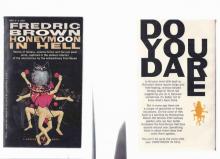 Hall of Mirrors
Hall of Mirrors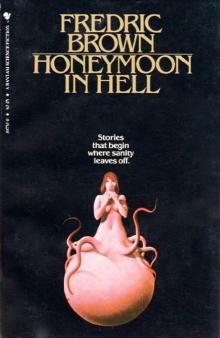 Honeymoon in Hell
Honeymoon in Hell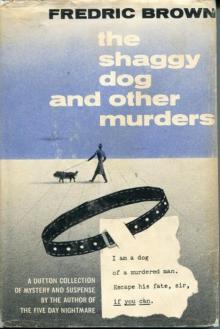 The Shaggy Dog and Other Murders
The Shaggy Dog and Other Murders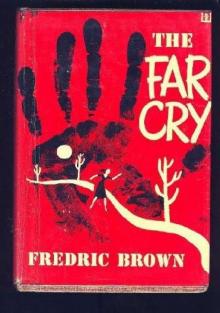 The Far Cry
The Far Cry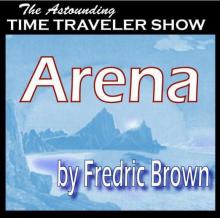 Arena
Arena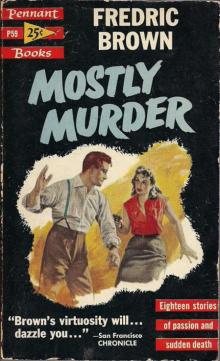 Mostly Murder
Mostly Murder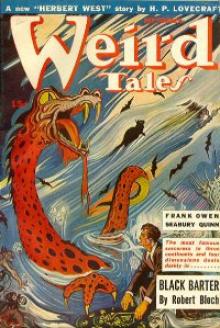 The Geezenstacks
The Geezenstacks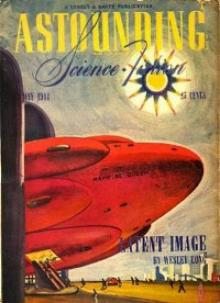 The Yehudi Principle
The Yehudi Principle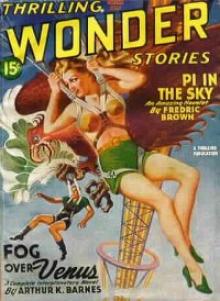 Pi in the Sky
Pi in the Sky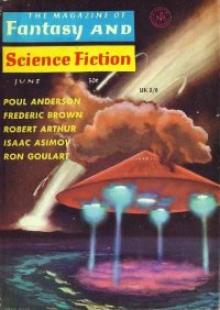 Eine Kleine Nachtmusik
Eine Kleine Nachtmusik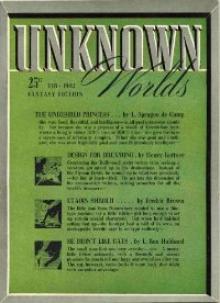 Etaoin Shrdlu
Etaoin Shrdlu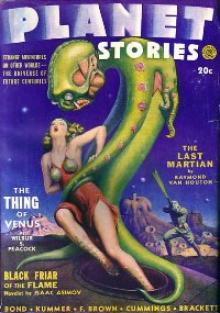 The Star Mouse
The Star Mouse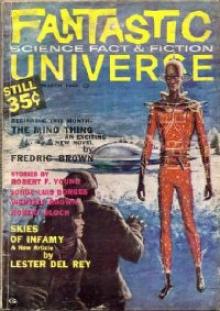 The Mind Thing
The Mind Thing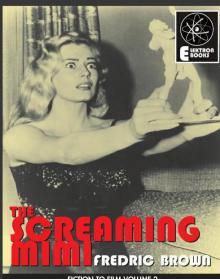 The Screaming Mimi
The Screaming Mimi The Fabulous Clipjoint
The Fabulous Clipjoint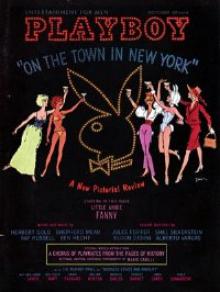 Puppet Show
Puppet Show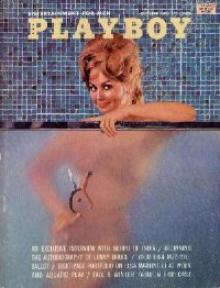 It Didn't Happen
It Didn't Happen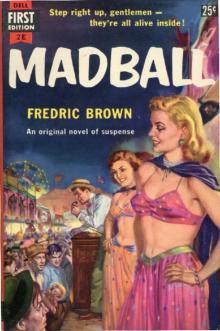 Madball
Madball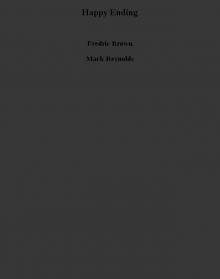 Happy Ending
Happy Ending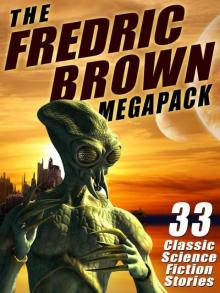 The Fredric Brown Megapack: 33 Classic Science Fiction Stories
The Fredric Brown Megapack: 33 Classic Science Fiction Stories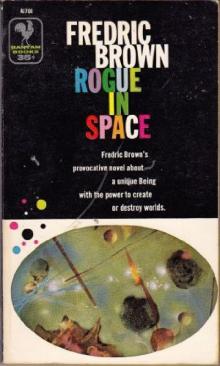 Rogue in Space
Rogue in Space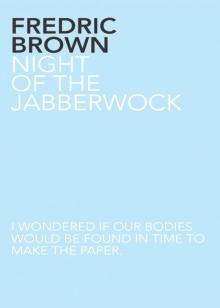 Night of the Jabberwock
Night of the Jabberwock The Dead Ringer
The Dead Ringer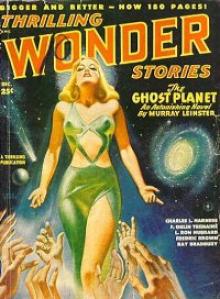 Knock
Knock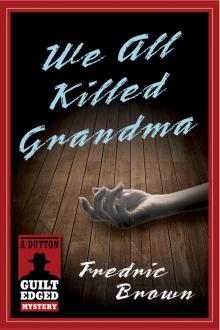 We All Killed Grandma
We All Killed Grandma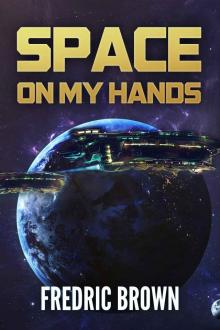 Space On My Hands
Space On My Hands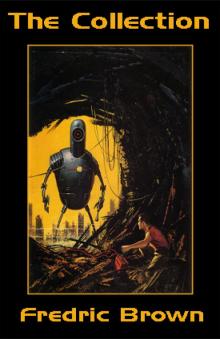 The Collection
The Collection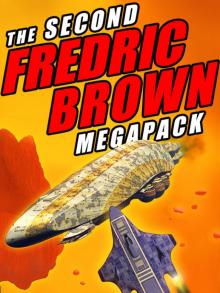 The Second Fredric Brown Megapack: 27 Classic Science Fiction Stories
The Second Fredric Brown Megapack: 27 Classic Science Fiction Stories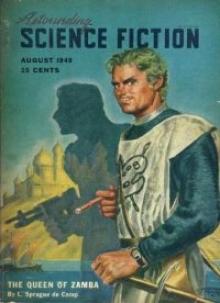 Letter to a Phoenix
Letter to a Phoenix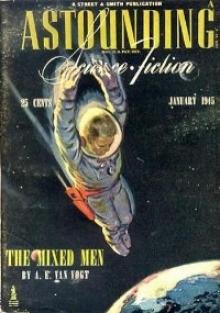 The Waveries
The Waveries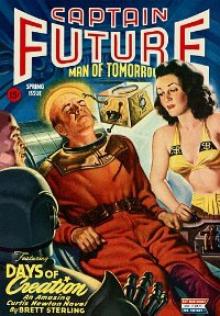 Nothing Sirius
Nothing Sirius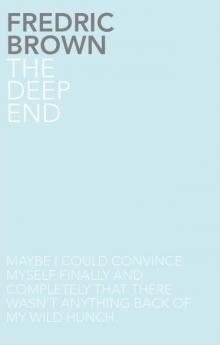 The Deep End
The Deep End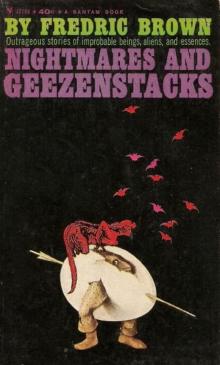 Nightmares & Geezenstacks
Nightmares & Geezenstacks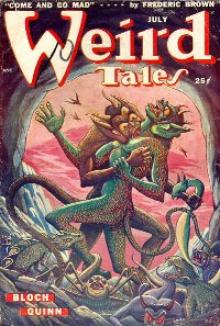 Come and Go Mad
Come and Go Mad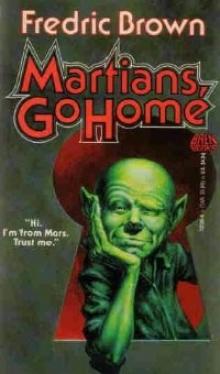 Martians, Go Home
Martians, Go Home